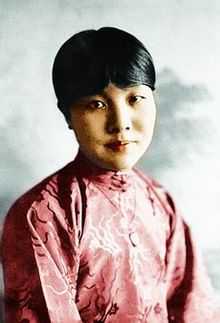Bingxin
| Bingxin (Xie Wanying) |
|---|
|
Bing Xin in the 1920s. |
| Born |
(1900-10-05)5 October 1900
Fuzhou, Fujian, Qing china |
|---|
| Died |
28 February 1999(1999-02-28) (aged 98) |
|---|
| Alma mater |
Yenching University |
|---|
| Spouse(s) |
Wu Wenzao |
|---|
| Parent(s) |
Xie Baozhang (謝葆璋)
Yang Fuci (楊福慈) |
|---|
| Awards |
1998 Lu Xun Literary Prize |
|---|
|
Bingxin |
| Chinese |
冰心 |
|---|
| Literal meaning |
Ice Heart |
|---|
|
|
Xie Wanying (October 5, 1900 – February 28, 1999), better known by her pen name Bingxin or Xie Bingxin, was one of the most prolific Chinese writers of the 20th Century. Many of her works were written for young readers. She was the chairperson of the China Federation of Literary and Art Circles. Her pen name Bingxin (literally "Ice Heart") carries the meaning of a morally pure heart, and is taken from a line in a Tang Dynasty poem by Wang Changling.
Life and Literary Career
Bingxin was born in Fuzhou, Fujian, but moved to Shanghai with her family when she was seven months old, and later moved yet again to the coastal port city of Yantai, Shandong, when she was four. Such a move had a crucial influence on Bingxin's personality and philosophy of love and beauty, as the vastness and beauty of the sea greatly expanded and refined young Bingxin's mind and heart. It was also in Yantai Bingxin first began to read the classics of Chinese literature, such as Romance of Three Kingdoms and Water Margin, when she was just seven. In 1913, Bingxin moved to Beijing. The May Fourth Movement in 1919 inspired and elevated Bingxin's patriotism to new high levels, starting her writing career as she wrote for a school newspaper at Yanjing University where she was enrolled as a student and published her first novel. Bingxin graduated from Yanjing University in 1923 with a Bachelor's Degree, and went to the United States to study at Wellesley College, earning a Master's Degree at Wellesley in literature in 1926. She then returned to Yanjing University to teach until 1936. In 1929, she married Wu Wenzao, an anthropologist and her good friend when they were studying in the United States. Together, Bingxin and her husband visited different intellectual circles around the world, communicating with other intellectuals such as Virginia Woolf. Later in her life, Bingxin taught in Japan for a short period and stimulated more cultural communications between China and the other parts of the world as a traveling Chinese writer. In literature, Bingxin founded the "Bingxin Style" as a new literary style. She contributed a lot to children's literature in China (her writings were even incorporated into children's textbooks), and also undertook various translation tasks, including the translation of the works of Indian literary figure Rabindranath Tagore. Bingxin's literary career was a really prolific and productive one, and she wrote a wide range of works—prose, poetry, novels, reflections, etc. Her career spanned more than seven decades in length, from 1919 to the 1990s.
Legacy
There is a Bing Xin Literature Museum in Changle in Fujian Province.[1]
Selected works
- Jimo (寂寞, Loneliness) (1922)
- Chaoren (超人, Superman) (1923)
- Fanxing (繁星, A Myriad of Stars) (1923)
- Chunshui (春水, Spring Water) (1923)
- Liu yi jie (六一姐,Six-one sister) (1924)
- Ji xiao duzhe (寄小读者, To Young Readers) (1926)
- Nangui (南归, Return to the South) (1931)
- Bingxin Quanji (冰心全集, The Collected Works of Bingxin) (1932–1933)
- Yinghua zan (樱花赞, Cherry Blossom Praise)
- Wo men zheli meiyou dongtian (我们这里没有冬天, Here, We Do Not Have Winter) (1974)
- Wo de guxiang (我的故乡, My Home) (1983)
- Guanyu nuren (关于女人, About Females) (1999)
Works available in English
References
Further reading
External links
 |
Wikiquote has quotations related to: Bingxin |
